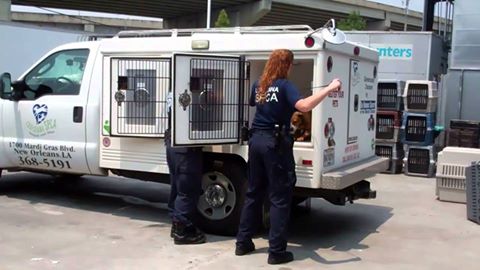
Transparency is the hallmark of accountability, the best disinfectant for corruption. And there is no better example than the No Kill movement itself. The only thing that has forced the large national groups and shelters across the country to embrace positive, life-affirming changes to the way they have long operated and to reduce the sheer number of animals they have long needlessly killed was the court of public opinion. Public access to statistics about how many and which animals are being killed, often at taxpayer expense, is a vital precursor to bringing that killing to an end.
In a victory for transparency, for the rights of the public, and for protection of animals, the Louisiana Court of Appeal just ruled against the Louisiana SPCA which refused to provide information on dogs they killed to a group called Bulldog Rescue Mission. The Bulldog rescue group “sought specific information as to the LSPCA definitions, policies, procedures, and outcomes related to the evaluation, adoption, and/or euthanasia of surrendered/stray animals in control of the LSPCA,” information it was refusing to willingly disclose under the claim that as a private agency, it was not subject to public disclosure laws.
Not surprisingly, the City punted to the LSPCA, the LSPCA punted back to the City: “By letter from the City Attorney’s office dated June 4, 2015, the City responded that the City was not custodian of these records and that the records request should be directed to the LSPCA. Accordingly, on June 5, 2015, the Bulldog Rescue sent the public records request directly to the LSPCA. On June 10, 2015, the LSPCA responded by letter … declaring that the LSPCA was not a ‘public body’ and, thus, not subject to the Public Records Law.”
BRM sued. And eventually won.
The Court ruled that since the requirement of providing animal control services belongs to the municipality (it is, in other words, a government function) and that the LSPCA is contracting to provide those services, it is a quasi-public agency subject to the disclosure laws. If it looks like a duck, acts like a duck, and quacks like a duck, it is a duck:
[T]he LSPCA receives an annual compensation of almost two million dollars for providing the services and, even accepting that this amount is only a percentage of the LSPCA budget, it is a substantial sum of money derived from public funds. According to the CEA, the City provided vehicles to the LSPCA and continues to fuel and maintain these City-provided vehicles. Finally, in wearing uniforms while investigating municipal violations, the appearance of the LSPCA officers is clearly designed to indicate a quasi-official status and, in serving municipal citations and appearing in municipal court regarding municipal code violations, the LSPCA officers clearly operate under the color of City authority. Thus, the old adage about walking and talking like a duck appears applicable here: the LSPCA performs municipal functions on behalf of the municipal government and, in so doing, is both compensated by the municipality and acts under the auspices of the municipality. Under these circumstances, the LSPCA is clearly a quasi-public entity subject to the Public Records Law.
The Louisiana court is not alone. The Texas Supreme Court recently reached the same conclusion. In Greater Houston Partnership v. Paxton, the Court created a test that should make virtually all private but publicly funded Texas humane societies and SPCAs subject to the Public Records Act. The Court wrote that a private organization will be subject to the Public Information Act if its public funding is “require[d] [for] them to operate in whole or in part.” As a result, its memos, e-mails, and records, including animals they have killed, are legally required to be disclosed.
It is tragic that a defeat of the local SPCA means a victory for animals, but pretending otherwise is a mortal threat to the lives of animals. Without transparency, the principles of compassion and decency get trampled. As Martin Luther King, Jr. once astutely noted, “Like a boil that can never be cured so long as it is covered up but must be opened with all its ugliness to the natural medicines of air and light, injustice must be exposed, with all the tension its exposure creates, to the light of human conscience and the air of national opinion before it can be cured.”
The case is NEW ORLEANS BULLDOG SOCIETY v. LOUISIANA SOCIETY FOR THE PREVENTION OF CRUELTY TO ANIMALS, et al. 2016 WL 4698255 (La.App. 4 Cir. 9/7/16).
————-
Have a comment? Join the discussion by clicking here.